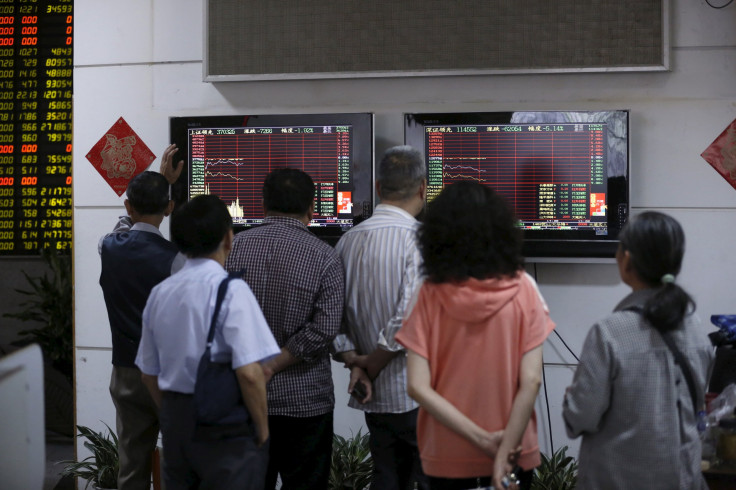For Nervous Investors, China Stock Market Rout Eclipses Greek Debt Crisis

Two of the world’s great economic regions rattled global markets at virtually the same time this week. The implosion of China’s $10 trillion stock bubble accelerated, bringing major markets in the world's second-biggest economy down 30 percent from mid-June highs. Meanwhile in Europe tensions over the Greek debt crisis neared a peak as the continent's finance leaders scrutinized Greece's final bailout proposal.
Add to those tremors the New York Stock Exchange abruptly shutting down Wednesday for more than three hours without explanation (the exchange blamed a software error).
Which crisis poses the greatest risk to U.S. investors?
Though the Greek drama has kept world markets edgy for months -- a Greek exit from the European monetary union would threaten the foundations of the $13 trillion eurozone economy -- China’s massive sell-off could prove far costlier.
China stocks rebounded Thursday as Beijing instituted further stimulus measures. But if the rout deepens, says Oppenheimer & Co. market strategist John Stoltzfus, “China’s economy would create collateral damage that is much greater than a Grexit would be to the euro.”
Moment Of Reckoning
In neither case are U.S. investors terribly exposed, at least directly. Greece’s $320 billion debt is held largely by European central banks. And despite Beijing moving recently to welcome outside investors into its markets, fewer than 1 percent of mainland stocks are foreign-held.
But with China’s booming upper and middle classes stretched far and wide in their search for profitable investments, like Manhattan condos and luxury art, sudden plunges in wealth are sure to have ripple effects worldwide.
The Chinese government has carefully cultivated the fortunes of its nouveau riche. For years, Beijing goosed China’s property market, leading to a speculative boom that has tapered in recent years. Stimulative interest rate cuts followed, intended to encourage borrowing and investment.
Meanwhile, China loosened rules for retail investors and the ranks of the Chinese stock-owning class swelled with people who had never before traded a share. In fact, two thirds of China’s new investors in 2014 had not even completed high school. By now, 90 million Chinese individuals own stocks.
The Shanghai Composite, one of two major Chinese exchanges, rallied 150 percent from June 2014 to its peak last month. Its growth was swelled by retail investors buying on leverage -- borrowing against the value of their stocks to buy more. According to Bloomberg, leverage ballooned by a factor of five in that time.
By early 2015, it was clear that Chinese markets were in the throes of irrational exuberance.
“What the Chinese market was experiencing was just too distanced from reality not to have a moment of reckoning,” Stoltzfus says.
That reckoning is here, and it has cost investors more than $3 trillion.
As the market tumbles, so do the investments of 90 million savers. And since so many of them were leveraged, there has been a rush to dump stocks to cover margins. The Communist government, eager to maintain faith in its new stock markets, forbade state-owned companies from selling shares and bought up equities to prop up the market.
But dramatic as the sell-off has been, Stoltzfus points out that the global financial system is relatively insulated from Chinese stock markets. China’s productive economy relies comparatively little on its equities market. Moreover, only about 15 percent of the Chinese population owns individual shares. “A decline will likely be digestible by the Chinese economy,” Stoltzfus says.
Iron And Apple
But that doesn’t mean there won’t be fallout in the U.S.
As Chinese equities have plunged, speculators have dropped commodities like iron and cotton. Chinese iron ore prices dropped to a six-year low. One analyst said that the price of a ton of steel in China had dropped below that of a ton of cabbage.
If the Chinese economy follows its stock markets into decline, dampened spending could be felt in commodities markets the world over. China has already been decelerating from blistering 20 percent growth rates as recently as 2011.
One notable American stock has been tugged down by the turmoil in China: Apple. IPhone sales in China recently exceeded U.S. sales for the first time, signalling a huge market opportunity for Apple. But a sinking Chinese market has made investors wary of growth prospects. Apple shares have dropped 4 percent since the start of the month.
But if some predictions hold true, Apple may not have to worry long. Goldman Sachs analysts have said that the decline will reverse and a major Chinese index, the CSI 300, will rise by more than a quarter in the coming year. With roughly half of its stocks halted, the Shanghai Composite Index rose 4.5 percent Friday.
Hopes are also up for a deal between Greece and its creditors, at long last. On Thursday Greek negotiators submitted a last-minute proposal to European finance ministers, garnering some positive early reactions.
Stoltzfus, too, cautions against doomsaying. “This is certainly drama worth talking about, but the real risk is in projecting this overly negatively to the world economy.”
© Copyright IBTimes 2024. All rights reserved.






















